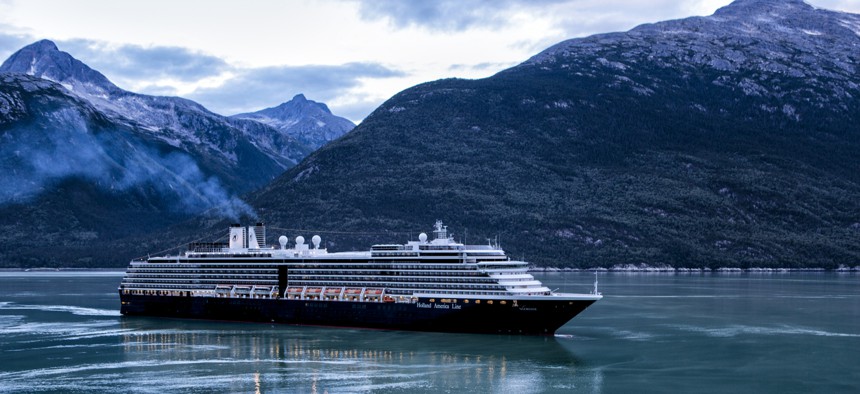With New Tourism Campaign, Alaska Pleads ‘Don’t Forget About Us’

Holland America cruise ship MS Noordam sailing into Skagway, Alaska, at dawn, Aug. 25, 2015. iStock.com/urbanglimpses
Alaska launched a national campaign to attract tourists back, offering free vaccinations at that state’s major airports as an incentive.
Alaska will launch a nationwide advertising campaign to compel tourists to visit the state this spring and summer, a sprawling effort that will include free vaccinations for travelers at the state’s major airports, Gov. Mike Dunleavy announced last week.
The national campaign, funded via federal coronavirus relief money and coordinated through the governor’s office, will feature digital, print, TV and radio advertisements, intended to make sure that residents of the lower 48 states “don’t forget about Alaska,” Dunleavy said at a press conference announcing the initiative. “Don’t get me wrong—there’s a lot of beautiful states in the lower 48, but this is a spectacular state. This is the only way we can describe us.”
The state will also offer free vaccinations to visitors who pass through airports in Anchorage and Fairbanks, with discussions underway to expand the initiative to other ports of entry as well. Demand for the vaccine within Alaska has plateaued, Dunleavy said, leaving a surplus that officials feel can best be utilized for health-conscious visitors who might otherwise be interested in traveling there.
“So what we’re saying to our tourists is, starting June 1, if you come to Alaska, you get a free vaccination, if you want one,” he said. “You don’t have to pay for it. We’ll have things set up at the airport, and we’ll help you out.”
The governor said he would also propose a $150 million plan to “provide relief to communities, cultural tourism businesses, as well as tourism, hospitality, and ancillary businesses throughout Alaska affected by the loss of a cruise ship and tourism season.”
The plan, expected to be submitted to the legislature this week, would be funded by federal relief money and would include direct input from tourist associations and business owners on the type of mitigation measures that would provide immediate relief. That could include exemptions from certain tourism-related licensing fees, though details will depend on what Lt. Gov. Kevin Meyer hears on an upcoming two-week “listening tour” with people around the state.
The campaign comes as state officials brace for the possibility of a second tourism season without cruise ships, one of its main drivers for visitors. The Centers for Disease Control and Prevention last fall extended a “no-sail order,” which suspends cruise ship travel from U.S. ports through October of this year, unless federal officials decide otherwise. The initial ban, issued last March, came after a number of ships experienced coronavirus outbreaks, a risk that federal officials said last fall was still present “even when ships sail at reduced passenger capacities.”
Cruise ship tourism in Alaska is also impacted by closures at ports in Canada, which include a ban on vessels carrying more than 100 people that continues through next February.
Alaskan lawmakers filed a joint resolution April 7 asking Congress to help by exempting the state from laws that “require cruise ships to stop at a Canadian or other foreign port.” Failing that, the resolution implores President Biden to “exercise his authority to allow cruise ships to travel directly on round-trip itineraries” to and from ports in Washington state, circumventing Canada completely.
Dunleavy on Friday said the situation was urgent, noting the state’s relatively short—and lucrative—tourism season. In 2019, roughly half of the state’s visitors came by cruise ship, according to the joint resolution.
“Alaska is in a unique position. We’re not the Caribbean, we’re not the Mediterranean, We’re not Hawaii,” he said. “Ours is a seasonal cruise ship season, so if we don’t know in the next couple of days … I’m afraid those assets by those cruise companies will be deployed other places, and my concern is that this will be two years in a row we may lose this investment. We need a little help from the CDC and the federal government.”
Without formal intervention from the federal government, Dunleavy said he would consider legal action, including potentially signing onto a lawsuit filed earlier this month by Florida Gov. Ron DeSantis. The suit, filed April 8 against the CDC and the Biden administration, calls for the immediate resumption of domestic cruises on the grounds that the agency’s actions are “arbitrary and capricious.”
The court should “set aside the CDC’s unlawful actions and hold that cruises should be allowed to operate with reasonable safety protocols,” the filing says.
Dunleavy said his administration would “be in conversation with and, quite frankly, we may sign up with” officials in Florida.
“We’re not doing this as a threat,” he said. “We want to work with the federal government. But if that’s the only tool that's going to be left in our toolbox, we’re prepared to pursue that.”
Kate Elizabeth Queram is a senior reporter for Route Fifty and is based in Washington, D.C.
NEXT STORY: The Federal Government Will Now Give PPP Loans to Borrowers in Bankruptcy





